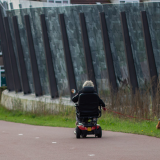
Serviciile publice
Serviciile publice precum sănătatea, învățământul, asistența socială și transportul sunt esențiale pentru atingerea unor niveluri ridicate de protecție socială, de coeziune socială și de incluziune socială. Dar factorii care determină succesul acestora într-un peisaj social și demografic în schimbare sunt calitatea serviciilor și accesul la ele.
Pentru factorii de decizie politică, provocarea constă în asigurarea conceperii și a prestării unor servicii sociale și de sănătate care să răspundă nevoilor variate ale cetățenilor. Această provocare a fost amplificată de constrângerile financiare severe din ultimii ani și de creșterea cererii, determinată în parte de îmbătrânirea demografică și, într-o oarecare măsură, de afluxul de refugiați în Europa. Pe lângă accesibilitate și calitate, în prezent apar și alte probleme. Printre ele se numără riscul ca noile canale digitale pentru furnizarea de servicii să izoleze comunitățile deja defavorizate, precum și eventualele dificultăți întâmpinate în asigurarea standardelor de acces la servicii și de calitate a acestora.
Pachetul privind investițiile sociale al Comisiei Europene, lansat în 2013, îndeamnă statele membre să pună un accent mai mare pe serviciile publice de înaltă calitate. În plus, strategia privind piața unică digitală pentru Europa, adoptată de Comisie în 2015, pune accentul pe modernizarea serviciilor publice ca modalitate de stimulare a competitivității. Adoptarea noilor tehnologii, a serviciilor publice online și a interoperabilității transfrontaliere sunt esențiale pentru creșterea eficienței costurilor și a calității serviciilor. În aprilie 2017, Comisia a lansat pachetul pilonului european al drepturilor sociale, care include printre principiile de bază accesul la o educație de bună calitate, la educația și îngrijirea copiilor preșcolari, la asistență medicală, la locuințe sociale și la alte servicii de bază.
- Comisia Europeană: Pachetul privind investițiile sociale
- Comisia Europeană: Piața unică digitală
- Comisia Europeană: Pilonul european al drepturilor sociale



























